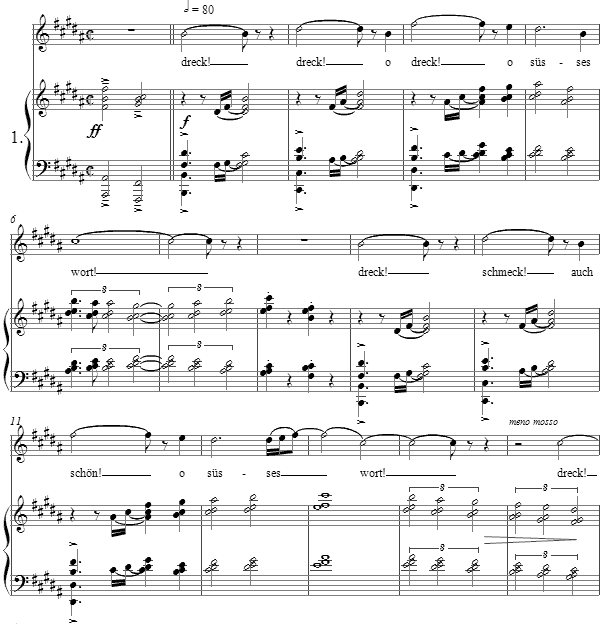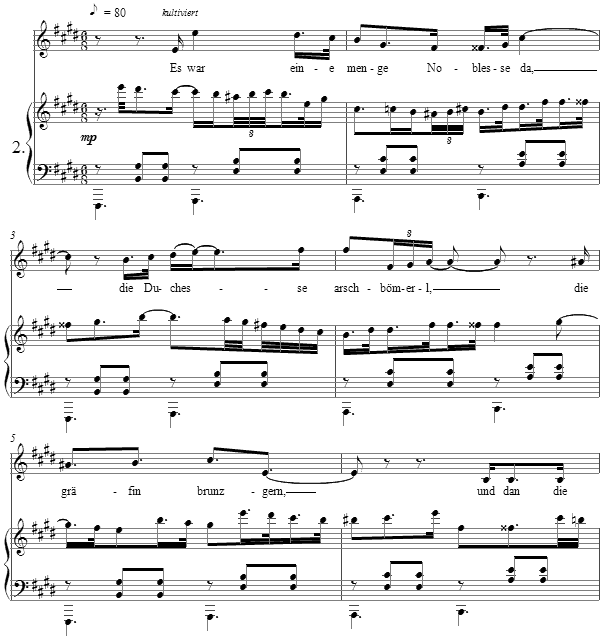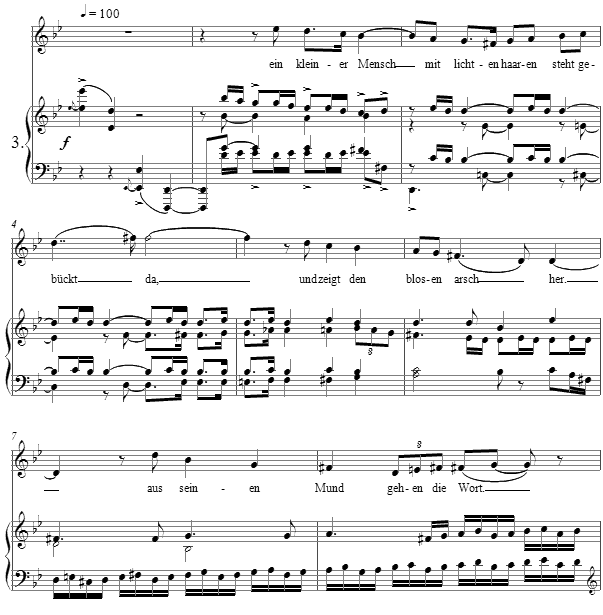Music and Texts of GARY BACHLUND
Vocal Music | Piano | Organ | Chamber Music | Orchestral | Articles and Commentary | Poems and Stories | Miscellany | FAQs
Drei Kleinigkeiten - (2007)

W. A. Mozart
for high voice and piano
i. dreck [ 3 pages, circa 1' 35" ]
dreck!
dreck!
o dreck!
o süsses wort!
dreck!
schmeck!
auch schön!
dreck, schmeck,
dreck!
leck
o charmante!
dreck, leck!
das freüet mich!
dreck, schmeck und leck!
schmeck dreck,
und leck dreck!
ii. eine menge Nobleße [ 2 pages, circa 1' 15" ]
Es war eine menge Nobleße da,
die Ducheße arschbömerl,
die gräfin brunzgern,
und dan die fürstin riechzumtreck,
mit ihrn 2 töchter,
die aber schon
an die 2 Prinzen Mußbauch vom Sauschwanz
verheyratet sind.
iii. so, ich bitte [ 3 pages, circa 1' 10" ]
ein kleiner Mensch
mit lichten haaren steht gebückt da,
un zeigt den blosen arsch her.
aus seinen Mund gehen die Wort.
guten appetit zum schmaus,
der andere wird gemacht,
in stiefl und sporn,
ein roths kleid,
eine schöne Perücke nach der Mode;
er muß von mitterer grösse seyn.
er wird in der Positur vorgestellt
wie er den andern just im arsch leckt.
aus seinen Mund gehen die worte.
ach, da geht man drüber n'aus.
so, ich bitte.
[ 8 pages, circa 4' 00" ]
Wolfgang Amadeus Mozart
The brilliance of his work and legendary status of his life and exploits needs no further historical background for the purposes of this site. I chose these humorous examples of Mozart's own words, found in his letters to family members, to illustrate the breadth of a man, any man, as Goethe so eloquently speaks of in his short epigram which reads:
Teilen kann ich nicht das Leben,
Nicht das Innen, noch das Außen,
Allen muß das Ganze geben,
Um mit euch und mir zu hausen.
Immer hab ich nur geschrieben,
Wie ichs fühle, wie ichs meine,
Und so spalt ich mich, ihr Lieben,
Und bin immerfort der Eine.
(I cannot divide life into an inside and an outside. In order to live with you and myself, I must give all of you the whole of me.
Always, I have just written as I felt, as I thought. In this way, dear friends, I split myself and at all times remain one.)
The undivided "one" of Mozart includes some scatological talk, alongside the glory of his choral and organ works and the wondrous opera and instrumental for which Western culture is all the better. The play and subsequent film, Amadeus, make much of the seeming inanities of the man, but this has always seemed to me a gross injustice. Rather, as with us all, this creative and most productive genius had many sides. I choose to enjoy this side of the man as well, through these settings.
i. filth
filth!
filth!
o filth!
o sweet word!
filth!
savor!
also lovely!
filth, savor!
filth!
lick!
o charming!
filth! lick!
I like that!
filth! savor! lick!
savor filth!
lick filth!
ii. a Noble crowd
A Noble crowd
the Duchess Butt-Boom,
the Countess Perky-Pisser,
and then the Princess Stinks-of-Crowds,
with her two daughters,
who so luckily are married to
the two Princes Pot-Belly of Pig-Prick.
iii. so, I ask
a little man
with light hair stood there bent over,
and showed a bare butt.
From out of his mouth came the word.
Good eating, of this feast.
Another was there too,
in boots and spurs,
a red coat,
a lovely, fashionable wig;
he was about average in height.
He cut a fine figure,
as if the other had just licked his behind.
From his mouth came the words.
Ah, such as it is...
so, I ask....
The celebration of filth is what some point to as Mozart's coarser side, but I suspect he was as much reveling in the words themselves, as telling any more than that. The setting is metrically square and affirmative in its stance. Why not savor these silly words, as he must have too?
Marked "cultivated," this setting is meant to show something of the outward obsequiousness with which civil society likes to see itself. Mozart chose to rename the aristocracy by coarse biological humor, reminding us that those "greats" among our society are not often remembered in the same way generations hence. Those who lorded over Mozart take their place in his private writings so disrespectfully.
The last setting is a pastiche and parody of some of Mozart's well-known themes, which I stitch together for fun, meaning no disrespect to his high art. Rather, given his own private and risqué prose of which this is but a sample, this is to allow Mozart's own gestures to tumble about as the underscore to his prose.
The score of Drei Kleinigkeiten in the high key is available as a free PDF download, though any major commercial performance or recording of the work is prohibited without prior arrangement with the composer. Click on the graphic below for this piano-vocal score.



